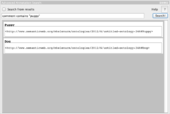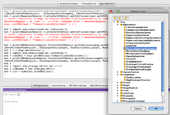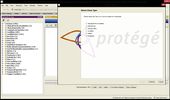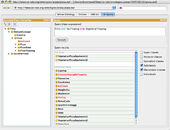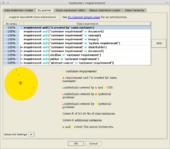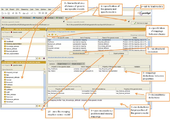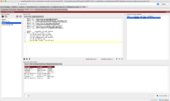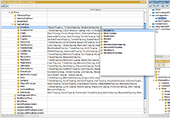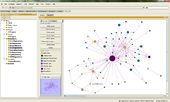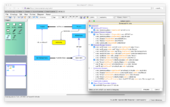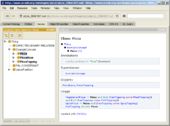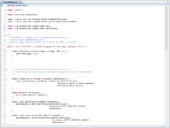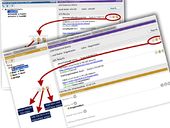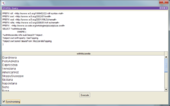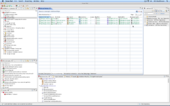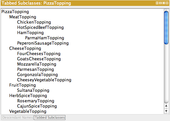Semantic Web
From Protege Wiki
Topic - Semantic Web
| Advanced Annotation Search | |
| A search function to find entities based on annotation data. |
| Annotation Search View | |
| A view for searching entity annotations for a string or regular expression match. Can also be used with no string specified, just the annotation URI, for finding deprecated entities, or TODO items. |
| Annotation Template View | |
| A view that can be configured to show a set of standard annotation fields for every class/property/individual. This makes it quicker to annotate as they are always in the same order, editable inline and easy to navigate. |
| BeanshellView | |
| Some coding doesn't justify setting up an entire Java build environment and/or requires immediate feedback. The Beanshell view allows programmatic access from within Protege for querying and manipulating ontologies, or even interacting with the UI. For more information see the Beanshell website. |
| Cardinality View | |
| An experimental alternative to the conditions widget that shows restrictions in relation to their cardinality. |
| Change View | |
| This view provides a very straightforward list of changesets and the axioms that have been added and removed. |
| CompGuide Editor | |
| CompGuide Editor is a tool used for the acquisition of Computer-Interpretable Guidelines in the CompGuide model for Clinical Practice Guidelines that also allows the editing of previously encoded guidelines. The Editor guides the users throughout the process of guideline encoding and does not require prociency in any programming language. |
| DL Query | |
| Quickly test definitions of classes to see that they subsume the appropriate subclasses. Or check for class membership of arbitrary descriptions without having to create named class placeholders. |
| DL-Learner | |
| The DL-Learner plugin allows learning equivalence and super class axioms based on the instance data in the ontologies loaded in Protégé. |
| MESAM | |
| The protégé MESAM plugin is a semi-automatic tool for defining a consistant OWL merged model composed of a generic model, a specific model and mapping between them. |
| Mastro DL-Lite Reasoner | |
| Mastro is an Ontology-Based Data Access (OBDA) management system. Ontologies in Mastro are specified through languages belonging to the DL-Lite family of lightweight Description Logics. The ontology is connected to external relational data management or data federation systems through a mapping establishing a semantic relation between SQL queries issued over the underlying databases and elements of the ontology. To access data, users can specify SPARQL queries over the ontology and make use of the query answering services provided by Mastro. |
| Matrix | |
| Several spreadsheet-style views of an ontology, including existential fillers, individual relationships, and an object properties view. |
| NaturalOWL | |
| NaturalOWL generates descriptions of individuals and classes from OWL ontologies that have been annotated with linguistic and user modeling resources expressed in RDF. Currently it supports English and Greek. |
| NavigOWL | |
| NavigOWL is a visualization tool which is specially designed to explore the semantic nets a.k.a Ontologies. The Tool is enriched with appealing graph layouts that can be applied over the semantic net in order to understand the structure of Ontologies easily and it facilitates the user to build mental map in more clear and consistent view of ontology graph. The tool supports rdf and owl Ontologies to visualize them. |
| NoHR | |
| NoHR (Nova Hybrid Reasoner) is a plug-in for Protégé that allows its users to query knowledge bases composed of an ontology in OWL 2 EL or OWL 2 QL (from version 2.0.0 on) and a set of Reasoning Rules.
Using a top-down reasoning approach, which means that only the part of the ontology and rules that is relevant for the query is actually evaluated, NoHR combines the capabilities of ELK and a dedicated direct translation for OWL 2 EL and OWL 2 QL respectively with the rule engine XSB Prolog to deliver very fast interactive response times. |
| [[Image:|thumb|170px|center]] | OBOConverter |
| A tab plugin that converts OBO format ontology files into OWL files using the OBO-to-OWL mapping created by NCBO. |
| OWL Lint | |
| The OWL Lint framework is designed to be a flexible way to define and run tests against a set of OWL ontologies for quality control, debugging, best practices, and many other purposes. |
| OWLAx | |
| Ontology Design Pattern Plugin for Protege.
It gives the option to sketch the ontology model within protege and automatically generate axioms from the figure. |
| OWLDoc | |
| Creates a bundle of (mostly) static HTML pages for publishing to the Web or distributing to colleagues. |
| [[Image:|thumb|170px|center]] | Ontology Evaluation |
| A tab widget plug-in for ontology evaluation from a set of criteria. |
| [[Image:|thumb|170px|center]] | Ontop |
| Ontop is a platform to query databases as Virtual RDF Graphs using SPARQL. It's extremely fast and is packed with features. Ontop is an open-source Ontology Based Data Access (OBDA) system that allows for querying relational data sources through a conceptual representation of the domain of interest, provided in terms of an ontology, to which the data sources are mapped. Key features of Ontop are its solid theoretical foundations, a virtual approach to OBDA that avoids materializing triples and that is implemented through query rewriting techniques, extensive optimizations exploiting all elements of the OBDA architecture, its compliance to all relevant W3C recommendations (including SPARQL queries, R2RML mappings, and OWL 2 QL and RDFS ontologies), and its support for all major relational databases. |
| [[Image:|thumb|170px|center]] | Owl2Cool |
| Owl2Cool is a tab-widget which provides an interface to Protege users for transorming a given OWL ontology to the object-oriented language COOL. After the transformation it produces in the given path a .clp file which can then be loaded to CLIPS for programming with production rules. |
| [[Image:|thumb|170px|center]] | Protege Wizards |
| Easier and faster creation of knowledge bases through wizards supporting task-oriented development. |
| Protege-OWL Code Generator | |
| Allows users to generate Java code from an ontology. |
| ProtégéLOV | |
| This plugin goal is to help ontologists searching for relevant vocabularies in the Linked Open Data (LOV) catalogue, for easing the development of ontologies by reusing existing vocabularies at low fine grained level. The tool helps to improve the modeling and reuse of ontologies used in the LOD cloud. |
| [[Image:|thumb|170px|center]] | RDF Backend |
| Create, import, and save RDF(S) files. Please note that this back-end was developed specifically for frame-based ontologies (not OWL). |
| ROWLTab | |
| SWRL Rule to OWL Axiom converter.
Convert SWRL rule to OWL Axiom. |
| [[Image:|thumb|170px|center]] | SADI Service plugin |
| The SADI plugin for Protege is a a collection of views and tools, available in a single tab, that simplify the provision of SADI Semantic Web Services by integrating the service creation and deployment environment into the ontology design environment. This allows drag-n-drop editing and testing of SADI Service interfaces from the ontologies and knowledgebases displayed in Protege. |
| [[Image:|thumb|170px|center]] | SKOS Editor |
| Supports viewing and editing of Simple Knowledge Organization System (SKOS) vocabularies. |
| SPARQL Query | |
| Provides support for composing and executing SPARQL queries from within Protege's user interface. |
| SWRL-IQ | |
| SWRL-IQ (Semantic Web Rule Language Inference and Query tool) is a plugin for Protege 3.4.x that allows users to edit, save, and submit queries to an underlying inference engine based on XSB Prolog. |
| Snow Owl | |
| Snow Owl is a free SNOMED CT browser and authoring tool integrating Protégé. |
| Taxonomy Cut+Paste | |
| Provides two quick ways to extract parts of a class hierarchy into text form for papers, presentations, etc. |
| [[Image:|thumb|170px|center]] | XML2OWL |
| This plugin allows for the mapping of new XML data to an existing OWL ontology through Protege. Mappings
are carried out according to user-provided rules, and result in new individuals and axioms in the ontology. |
